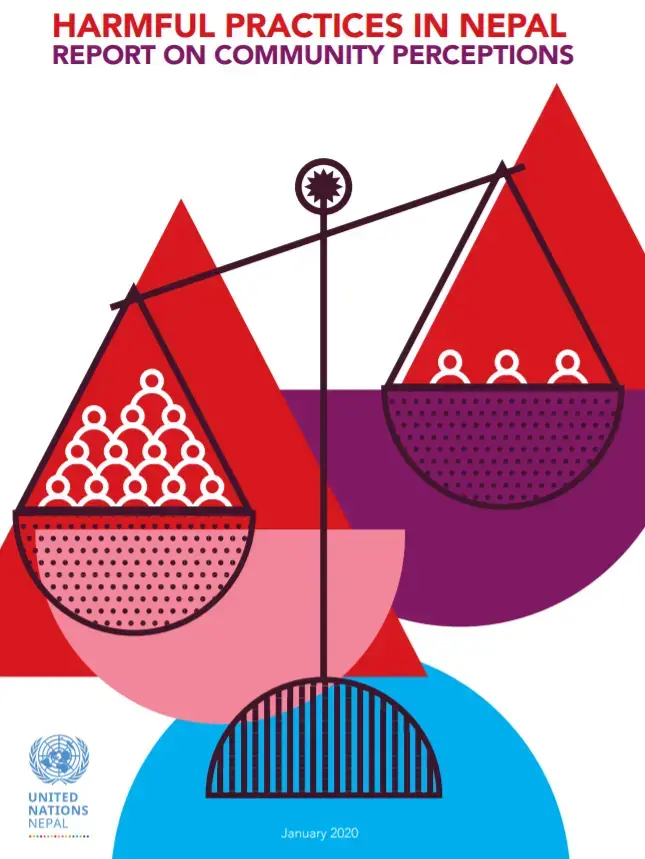Harmful practices can be defined as persistent behaviours that discriminate on the basis of sex, gender, age, caste/ethnicity, language, religion, amongst others. They leave women and people from excluded groups at risk of violence, poorer physical and psychological health, limited educational and economic outcomes, injuries, and even death. Notably, harmful practices are not isolated or random. They stem from deeply-rooted patriarchal, social, cultural and religious norms perpetuated throughout centuries that view women, as well as lower caste groups, as inferior.
Harmful practices are prevalent and often perceived as traditional and normal in the communities in which they are practiced, however, they prevent individuals and groups from reaching their full potential. Many are denied dignity and freedoms as a result of harmful practices. Based on the results of the 2017 Community Perception Survey, the UN Country Team (UNCT) in Nepal recognized harmful practices as a serious barrier to development outcomes, particularly for women and girls. These practices hinder inclusive governance and political participation, economic development, education, agricultural development, health and more, and ultimately prevent the realization of the Sustainable Development Goals and the principle of Leaving No One Behind.
Therefore, the UNCT established the Harmful Practices Working Group (HPWG) in 2018 to support an informed, coordinated and coherent approach to addressing harmful practices across outcome areas of the UN Development Assistance Framework (UNDAF) 2018-2022. It is recognized by the UNCT that addressing harmful practices requires a systematic, multi-sectoral, and multi-level approach which targets structural inequality and gender discriminatory social norms.
A number of harmful practices prevail in Nepal, however the HPWG selected caste-based discrimination, menstrual restrictions including chhaupadi, child marriage, dowry, and witchcraft accusations and persecution to be covered in a literature review and this survey. These practices were highlighted by the Concluding Observations of the Committee on the Elimination of Discrimination against Women (2018) as having serious negative impacts on women and girls in Nepal. This survey report aims to shed light on five of the prevailing harmful practices in Nepal and act as resource to understand these practices further. The survey findings provide data on the way in which these harmful practices are practiced in Province 2, Karnali Province and Sudurpaschim Province and highlights how they are deeply rooted in discriminatory social norms, often founded on religious beliefs and customs. It is evident from both the survey and literature review that more in-depth studies are required to strengthen our understanding on the ways in which we can promote social norm and transformative change in an effort to eliminate harmful practices.
हानिकारक प्रथा तथा चलनहरूलाई लैङ्गिकता, उमेर, जात-जाती, भाषा, धर्मलगायतका आधारहरूमा भेदभाव गर्ने निरन्तरको व्यवहारका रुपमा परिभाषित गर्न सकिन्छ । उनीहरूले महिला र बहिष्करणमा परेका समूहहरूलाई हिंसा, कमजोर शारीरिक तथा मनोवैज्ञानिक स्वास्थ्य, सीमित शैक्षिक तथा आर्थिक परिणाम, चोटपटक र मृत्युको पनि जोखिममा पुर्याउने गर्छन् । उल्लेखनीय कुरा के हो भने हानिकारक अभ्यासहरू कुनै एउटा ठाउँमा मात्र हुने वा यदाकदा हुने होइन्, यो त महिलाका साथै कथित तल्लो जातका समूहहरूलाई कमजोर वर्गका रुपमा हेर्ने सदियौं देखि लागु हुँदै आएको र गहिरो रुपमा जरा गाडेको पितृसतात्मक, सामाजिक, साँस्कृतिक तथा धार्मिक मुल्य-मान्यताहरूमा आधारित छन् ।
हानिकारक प्रथा तथा चलनहरू व्याप्त भएपनि र अभ्यास गरिने समुदायहरूले यसलाई प्रायः परम्परागत तथा सामान्य रुपमा लिने भएपनि यस्ता हानिकारक अभ्यासहरूको फलस्वरुप व्यक्ति तथा समूहहरू आफ्नो पूर्ण क्षमता अनुसार विकास
हुन सक्दैनन्, र निष्ठा तथा स्वतन्त्रताबाट बञ्चित हुने गर्छन् । सन् २०१७ को सामुदायिक सोच-मानसिकता सर्वेक्षणको निष्कर्षका आधारमा नेपाल स्थित संयुक्त राष्ट्रसंघले हानिकारक अभ्यासहरू, विशेषगरी महिला तथा बालिकाहरूका लागि, विकासका प्रतिफलहरूमा गम्भीर व्यवधान हुन् भनी स्वीकार गरेको छ । यी अभ्यासहरूले समावेशी शासन र राजनीतिक सहभागिता, आर्थिक विकास, शिक्षा, कृषिजन्य विकास, स्वास्थ्य र अन्य क्षेत्रमा व्यवधान खडा गरी अन्ततः सन् २०३० को एजेण्डा र कसैलाई पनि पछाडि नछोड्ने सिद्धान्तमा अवरोध सिर्जना गर्नेछन् । त्यसैकारण, यूएन कन्ट्री टीमले राष्ट्रसङ्घीय विकास सहायता ढाँचा (यूएनडिएएफ) २०१८–२०२२ का प्रतिफल क्षेत्रहरूमा हानिकारक अभ्यासहरूलाई सम्बोधन गर्ने सुसूचित, समन्वयात्मक र साझा अवधारणालाई मद्दत गर्न सन् २०१८मा हानिकारक अभ्यास कार्यदल (एचपीडब्लुजी)को स्थापना गर्यो । हानिकारक अभ्यासहरूलाई सम्बोधन गर्न संरचनागत असमानता र लैंगिक रुपमा विभेदकारी सामाजिक
मुल्यमान्यताहरूलाई लक्षित गर्ने एउटा व्यवस्थित, बहुआयामिक र बहुतहगत अवधारणा आवश्यक छ भन्ने कुरामा यूएनसीटी विश्वास गर्दछ ।
नेपालमा विभिन्न हानिकारक प्रथा तथा चलनहरूहरू प्रचलनमा रहेको भए तापनि हानिकारक प्रथा तथा चलनहरूहरू विरुद्धको कार्यदलले जातीय भेदभाव, छाउपडीसहित महिनाबारीको समयमा गरिने छोइछिटो, बालविवाह, दाइजो र बोक्सीको आरोप तथा उत्पीडनलाई प्रकाशित सामग्रीको समीक्षा र यो सर्वेक्षणका लागि छनौट गर्यो । यी अभ्यासहरूले नेपालमा महिला तथा बालिकाहरूमाथि गम्भीर नकारात्मक प्रभाव पारिरहेको कुरा महिला विरुद्ध हुने भेदभाव उन्मूलन समितिको २०१८ को निष्कर्ष टिप्पणीमा पनि उल्लेख गरिएको थियो । सर्वेक्षणको निष्कर्षले यी हानिकारक प्रथा तथा चलनहरूहरू प्रदेश नं २, कर्णाली प्रदेश र सुदूर–पश्चिम प्रदेशमा कसरी अभ्यास गरिएका छन् भन्ने बारेमा तथ्याड्ढ उपलब्ध गराउनका साथै ती अभ्यासहरूले प्रायः धार्मिक विश्वास र प्रचलनमा आधारित भेदभावकारी सामाजिक मूल्यमान्यतामा कसरी जरा गाडेको छ भन्ने तथ्यमाथि प्रकाश पार्दछ । सर्वेक्षण प्रतिवेदनको लक्ष्य नेपालमा प्रचलित हानिकारक प्रथा तथा चलनहरूहरू मध्ये पाँच वटा प्रथाहरूमाथि प्रकाश पार्नु र यी अभ्यासहरूका बारेमा थप बुझ्न स्रोतसामग्री बन्नु रहेको छ । दुवै सर्वेक्षण र लिखत समीक्षाबाट यो कुरा प्रस्ट छ कि हानिकारक अभ्यासहरूको उन्मूलन गर्ने प्रयासमा सामाजिक मुल्यमान्यतामा परिवर्तन र रुपान्तरणजन्य परिवर्तन प्रवर्द्धन गर्न विधिहरूबारे हाम्रो बुझाई थप सुदृढ बनाउन अझ विस्तृत अध्ययन अनुसन्धानको खाँचो छ ।


